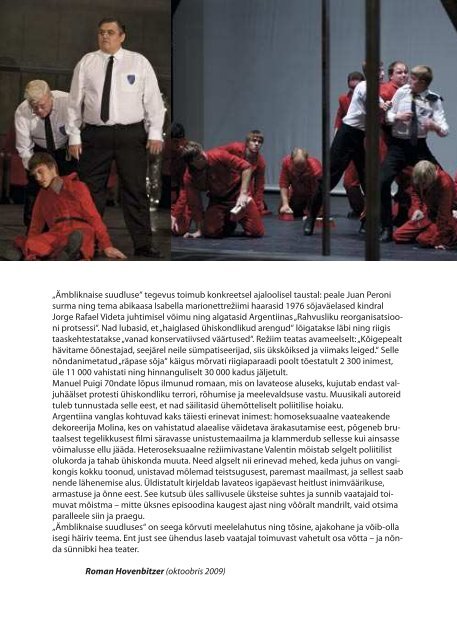Create successful ePaper yourself
Turn your PDF publications into a flip-book with our unique Google optimized e-Paper software.
„Ämbliknaise suudluse“ tegevus toimub konkreetsel ajaloolisel taustal: peale Juan Peroni<br />
surma ning tema abikaasa Isabella marionettrežiimi haarasid 1976 sõjaväelased kindral<br />
Jorge Rafael Videta juhtimisel võimu ning algatasid Argentiinas „Rahvusliku reorganisatsiooni<br />
protsessi“. Nad lubasid, et „haiglased ühiskondlikud arengud“ lõigatakse läbi ning riigis<br />
taaskehtestatakse „vanad konservatiivsed väärtused“. Režiim teatas avameelselt: „Kõigepealt<br />
hävitame õõnestajad, seejärel neile sümpatiseerijad, siis ükskõiksed ja viimaks leiged.“ Selle<br />
nõndanimetatud „räpase sõja“ käigus mõrvati riigiaparaadi poolt tõestatult 2 300 inimest,<br />
üle 11 000 vahistati ning hinnanguliselt 30 000 kadus jäljetult.<br />
Manuel Puigi 70ndate lõpus ilmunud romaan, mis on lavateose aluseks, kujutab endast valjuhäälset<br />
protesti ühiskondliku terrori, rõhumise ja meelevaldsuse vastu. Muusikali autoreid<br />
tuleb tunnustada selle eest, et nad säilitasid ühemõtteliselt poliitilise hoiaku.<br />
Argentiina vanglas kohtuvad kaks täiesti erinevat inimest: homoseksuaalne vaateakende<br />
dekoreerija Molina, kes on vahistatud alaealise väidetava ärakasutamise eest, põgeneb brutaalsest<br />
tegelikkusest filmi säravasse unistustemaailma ja klammerdub sellesse kui ainsasse<br />
võimalusse ellu jääda. Heteroseksuaalne režiimivastane Valentin mõistab selgelt poliitilist<br />
olukorda ja tahab ühiskonda muuta. Need algselt nii erinevad mehed, keda juhus on vangikongis<br />
kokku toonud, unistavad mõlemad teistsugusest, paremast maailmast, ja sellest saab<br />
nende lähenemise alus. Üldistatult kirjeldab lavateos igapäevast heitlust inimväärikuse,<br />
armastuse ja õnne eest. See kutsub üles sallivusele üksteise suhtes ja sunnib vaatajaid toimuvat<br />
mõistma – mitte üksnes episoodina kaugest ajast ning võõralt mandrilt, vaid otsima<br />
paralleele siin ja praegu.<br />
„Ämbliknaise suudluses“ on seega kõrvuti meelelahutus ning tõsine, ajakohane ja võib-olla<br />
isegi häiriv teema. Ent just see ühendus laseb vaatajal toimuvast vahetult osa võtta – ja nõnda<br />
sünnibki hea teater.<br />
Roman Hovenbitzer (oktoobris 2009)<br />
The musical „Kiss of the Spider Woman“ has a particular historical background: after Juan<br />
Peron’s death and the following puppet regime of his wife Isabella, the military junta under<br />
General Jorge Rafael Videtta seized power in 1976 and started the “process of national reorganization“<br />
in Argentina. “The morbid social developments“ had to be suppressed and the<br />
country had to re-establish “old conservative values”. The dictatorship declared openly: “First,<br />
the subversive elements must be destroyed, followed by their sympathizers’, those who are<br />
indifferent, and finally, those who are feeble.” During the so-called “dirty war”, the Establishment<br />
murdered 2,500 people, more than 11,000 were imprisoned and approximately 30,000<br />
simply disappeared. The libretto is based on Manuel Puig’s novel written at the end of the<br />
seventies that is a powerful accusation against the atmosphere of fear, terror, oppression<br />
and tyranny. We must give credit to the authors of the musical who have conveyed this unambiguous<br />
political pressure. Two totally different people meet in an Argentinian state prison.<br />
Molina, a homosexual window dresser who has been unjustly detained for an alleged<br />
seduction of an adolescent, escapes from brutal reality into the glamourous world of movies,<br />
clinging to this concrete possibility of survival. Valentin, a heterosexual, an enemy of the<br />
regime and a resistance fighter, faces the political situation and seeks a social solution. These<br />
completely different men who are brought together by misery in their prison cell, both<br />
dream of another, better world, which becomes the foundation of their close relationship.<br />
Basically, the play describes the everyday individual struggle for human dignity, personal<br />
love and happiness. It appeals for tolerance and helps us see the story not only as an episode<br />
from a distant time and foreign continent, but to draw parallels with the present day.<br />
„Kiss of the Spider Woman“ presents good entertainment along with serious, topical, and<br />
perhaps even disturbing issues. After all, it is exactly this mixture that enables the audience<br />
to participate directly in the events, and thus, good theatre is born.<br />
Roman Hovenbitzer (October, 2009 )

















